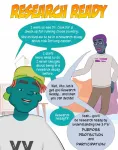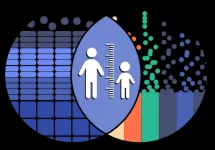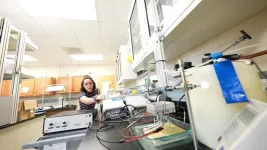(Press-News.org) With the goal of fostering awareness and identifying strategies to reduce bias within the medical genetics field and to improve health equity, members of the ACMG’s Social, Ethical and Legal Issues (SELI) and Diversity, Equity and Inclusion (DEI) Committees collaborated to address factors in which bias can occur in clinical genetic testing in a just-published statement, “Clinical, technical, and environmental biases influencing equitable access to clinical genetics/genomics testing: A points to consider statement of the American College of Medical Genetics and Genomics (ACMG)”.
This is the first joint statement of the ACMG’s SELI and DEI Committees. Co-lead author and workgroup co-chair Dena R. Matalon, MD, FACMG, said, “By teaming up with our ACMG DEI colleagues, we were able to address more topics thoughtfully than if we pursued this complex issue in each committee alone. Our goal in working together was to raise awareness about how bias affects all of us, ways in which it does that we may not have realized, how bias affects underrepresented minorities, and what we can do to begin to mitigate it. We ultimately want to provide more equitable clinical genetic care for all, and hope this document helps us take a step in that direction.”
“I am proud of the collaborative efforts of these two ACMG committees in developing this paper in that it reflects an honest and timely response to a set of issues of great importance to society, to the American healthcare enterprise and to members of the clinical team delivering genetic and genomic care to the patients and communities we serve,” said ACMG Interim CEO Robert G. Best, PhD, MS, FACMG. “This paper is a response to the growing recognition that disparities in medicine are common and that they propagate along the lines of race, geography and socioeconomics. The authors of this Points to Consider document articulate an interplay between nested systems within health care related to biases within environmental, clinical and technical domains and have begun to delineate the need for action that takes stock of the complex systems in which patient care plays out. ACMG is committed to learning, understanding and taking responsibility for the part that our discipline has played in sustaining a system that accepts inequity as being somehow beyond the level of our agency to meaningfully address, and this paper represents an early step along a better path.”
As genetic testing becomes more accessible within the US and the world, multiple inherent scientific and clinical biases must be overcome to achieve health equity for individuals for which care is provided, including those belonging to historically marginalized populations. The ACMG SELI and DEI workgroup members reviewed and categorized bias into three main areas: environmental, clinical and technical.
Environmental bias factors in which individuals may face discrimination include employment, medical insurance, housing, and interactions with colleagues, peers and medical institutions. Clinical factors that have contributed to inequities in genetic testing interpretation can encompass limited clinician diversity of representation, access to genetic services, education of both healthcare professionals and patients, and complexities associated with unknown family history and/or genetic ancestry. For example, with few genetics professionals being bilingual, non-English speaking patients are at a disadvantage in receiving culturally appropriate care. Thus, diversifying the genetics workforce must continue to be a high priority.
Lastly, difficulties have arisen in variant interpretation for historically marginalized populations undergoing clinical genetic testing, as most individuals that take part in genomic research studies have been of European descent. Multiple examples are provided in the new ACMG statement regarding these “technical” biases, and the statement highlights the need for an ongoing effort to recruit individuals from ancestral and biogeographically diverse populations to improve database genomic representation.
This document illustrates a framework that supports a positive and constructive dialogue among all stakeholders and lawmakers to continually address biases and keep advancing genetic testing in the clinic. The goal is to recognize and reduce bias, ensuring equitable care and avoiding unfair discrimination for all.
Cinthya J. Zepeda Mendoza, PhD, FACMG, co-lead author and workgroup co-chair, said, “Since its inception almost three years ago, the ACMG’s Diversity, Equity, and Inclusion Committee has been working hard to prioritize DEI principles within the College and the medical genetics specialties. This document is the culmination of a rewarding collaboration with our ACMG SELI colleagues, in which we addressed biases in clinical testing and their significant impact on individuals and communities, particularly those from underrepresented and marginalized backgrounds. Our goal with this publication is to disrupt our bias and to remain accountable in ensuring that individuals from all backgrounds receive the best possible care.”
About the American College of Medical Genetics and Genomics
Founded in 1991, the American College of Medical Genetics and Genomics (ACMG) is a prominent authority in the field of medical genetics and genomics and the only nationally recognized medical professional organization solely dedicated to improving health through the practice of medical genetics and genomics. The only medical specialty society in the US that represents the full spectrum of medical genetics disciplines in a single organization, the ACMG provides education, resources and a voice for more than 2,600 clinical and laboratory geneticists, genetic counselors and other healthcare professionals. ACMG’s mission is to improve health through the clinical and laboratory practice of medical genetics as well as through advocacy, education and clinical research, and to guide the safe and effective integration of genetics and genomics into all of medicine and healthcare, resulting in improved personal and public health. Genetics in Medicine and the new Genetics in Medicine Open, a gold open access journal, are the official ACMG journals. ACMG’s website, www.acmg.net, offers resources including policy statements, practice guidelines, and educational programs. The ACMG Foundation for Genetic and Genomic Medicine works to advance ACMG educational and public health programs through charitable gifts from corporations, foundations and individuals.
-end-
END
The ACMG publishes statement on clinical, technical and environmental biases influencing equitable access to clinical genetics/genomics testing
The American College of Medical Genetics and Genomics (ACMG) has just published: “Clinical, technical, and environmental biases influencing equitable access to clinical genetics/genomics testing: A points to consider statement of the ACMG.”
2023-04-14
ELSE PRESS RELEASES FROM THIS DATE:
Improving community outreach and engagement
2023-04-14
As researchers continue to make advances in new cancer prevention and treatment methods, it will not have much impact if the community is unaware and not engaged. For this reason, community outreach and engagement (COE) efforts are an important pillar of the University of Cincinnati Cancer Center’s mission.
Cancer Center researchers will present research abstracts on several COE initiatives at the American Association for Cancer Research Annual Meeting 2023, held in Orlando, Florida, April 14-19.
Encouraging ...
Healing the unhealable: New approach helps bones mend themselves
2023-04-14
Young babies and newborn mice can naturally heal damage to the bones that form the top of the skull, but this ability is lost in adults. In a new study published in Proceedings of the National Academy of Sciences, University of Pittsburgh researchers developed a novel approach that promoted bone regeneration in mice without implantation of bone tissue or biomaterials.
The technique uses a device similar to an orthodontic wire used to realign teeth to carefully stretch the skull along its sutures, activating ...
Scientists narrow down pool of potential height genes
2023-04-14
When it comes to height, our fate is sealed along with our growth plates—cartilage near the ends of bones that hardens as a child develops. Research publishing April 14 in the journal Cell Genomics shows that cells in these plates determine the length and shape of our bones and can hint at our stature. The study identified potential "height genes" and found that genetic changes affecting cartilage cell maturation may strongly influence adult height.
"The study is really understanding ...
Finding the dream team to beat the heat
2023-04-14
Associate Professor Jonathan Boreyko leads a team at Virginia Tech that has built a strong portfolio of work with ice and water, exploring the possibilities for de-icing planes, building novel water harvesting devices, and creating snow globes out of bubbles. This familiarity with water has given the team a strong sense of its behavior in different states, leading to a new project that shows how ice quenches heat in comparison to water. The findings were published in Chem on April 14.
Mojtaba Edalatpour and master’s student Camryn ...
Analysis of health and prescription data suggests chronic health conditions in U.S. incarcerated people may be severely undertreated
2023-04-14
Chronic conditions such as type 2 diabetes, asthma, HIV infection, and mental illness may be greatly undertreated in the U.S. jail and prison population, suggests a new study from researchers at the Johns Hopkins Bloomberg School of Public Health.
For their analysis, the researchers used national health survey data covering 2018 to 2020 to estimate rates of chronic conditions among recently incarcerated people, and a commercial prescription database to estimate the distribution of medication treatments to the jail and prison population. Their analysis suggests ...
In-person vs virtual education and community COVID-19 case incidence following school re-openings
2023-04-14
About The Study: In a study of matched pairs of counties that reopened with in-person versus virtual instruction at the secondary school level in the 2020 to 2021 academic year, counties with in-person school instructional models early in the COVID-19 pandemic experienced increases in county-level COVID-19 incidence at six and eight weeks after in-person reopening, compared with counties with virtual instructional models.
Authors: Meredith Matone, Dr.P.H., of Children’s Hospital of Philadelphia, is the corresponding author.
To access the embargoed study: Visit our For The ...
Black representation in the primary care physician workforce and its association with population life expectancy
2023-04-14
About The Study: The findings of this study of survival outcomes for 1,618 U.S. counties suggest that greater representation of Black primary care physicians (PCPs) in the PCP workforce is associated with improved survival-related outcomes for Black individuals, although there was a dearth of U.S. counties with at least one Black PCP during each study time point. Investments to build a more representative PCP workforce nationally may be important for improving population health.
Authors: John E. Snyder, M.D., M.S., M.P.H., and Rachel D. Upton, Ph.D., of the U.S. Department of Health and Human Services in Rockville, Maryland, are the corresponding ...
Racial, ethnic differences in barriers faced by medical college admission test examinees
2023-04-14
About The Study: In this study of 81,755 Medical College Admission Test examinees, American Indian or Alaska Native, Black, and Hispanic students reported lower parental educational levels, greater educational and financial barriers, and greater discouragement from pre-health advisers than white students. These barriers may deter groups underrepresented in medicine from applying to and matriculating at medical school.
Authors: Jessica Faiz, M.D., M.S.H.P.M., of the Veterans Affairs Greater Los Angeles Healthcare System and UCLA in Los Angeles, is the corresponding ...
Calling AI experts! Join the hunt for exoplanets
2023-04-14
Artificial Intelligence (AI) experts have been challenged to help a new space mission to investigate Earth’s place in the universe.
The Ariel Data Challenge 2023, which launches on 14 April, is inviting AI and machine learning experts from industry and academia to help astronomers understand planets outside our solar system, known as exoplanets.
Dr Ingo Waldmann, Associate Professor in Astrophysics, UCL (University College London) and Ariel Data Challenge lead said:
“AI has revolutionised many fields of science and industry in the past years. The field of exoplanets has fully arrived in the era of big-data and cutting edge AI is needed to break ...
Estonian researchers developed a method for instant energy-performance label
2023-04-14
The researchers of the FinEst Centre for Smart Cities of Tallinn University of Technology (Estonia, Europe) developed the DigiAudit platform to monitor and analyse energy use and indoor climate indicators of buildings and large real estate portfolios in real time. Thinnect, an Estonian IoT start-up company, will help sell the solution and market it worldwide.
We can only reach zero-emission buildings when we have reliable data
The European Union has set a target for all buildings to be zero-emission, or near-zero energy, by 2050. However, there is no reliable data on the energy consumption of many buildings, so it is not possible to monitor the condition ...
LAST 30 PRESS RELEASES:
CU Anschutz School of Medicine receives best ranking in NIH funding in 20 years
Mayo Clinic opens patient information office in Cayman Islands
Phonon lasers unlock ultrabroadband acoustic frequency combs
Babies with an increased likelihood of autism may struggle to settle into deep, restorative sleep, according to a new study from the University of East Anglia.
National Reactor Innovation Center opens Molten Salt Thermophysical Examination Capability at INL
International Progressive MS Alliance awards €6.9 million to three studies researching therapies to address common symptoms of progressive MS
Can your soil’s color predict its health?
Biochar nanomaterials could transform medicine, energy, and climate solutions
Turning waste into power: scientists convert discarded phone batteries and industrial lignin into high-performance sodium battery materials
PhD student maps mysterious upper atmosphere of Uranus for the first time
Idaho National Laboratory to accelerate nuclear energy deployment with NVIDIA AI through the Genesis Mission
Blood test could help guide treatment decisions in germ cell tumors
New ‘scimitar-crested’ Spinosaurus species discovered in the central Sahara
“Cyborg” pancreatic organoids can monitor the maturation of islet cells
Technique to extract concepts from AI models can help steer and monitor model outputs
Study clarifies the cancer genome in domestic cats
Crested Spinosaurus fossil was aquatic, but lived 1,000 kilometers from the Tethys Sea
MULTI-evolve: Rapid evolution of complex multi-mutant proteins
A new method to steer AI output uncovers vulnerabilities and potential improvements
Why some objects in space look like snowmen
Flickering glacial climate may have shaped early human evolution
First AHA/ACC acute pulmonary embolism guideline: prompt diagnosis and treatment are key
Could “cyborg” transplants replace pancreatic tissue damaged by diabetes?
Hearing a molecule’s solo performance
Justice after trauma? Race, red tape keep sexual assault victims from compensation
Columbia researchers awarded ARPA-H funding to speed diagnosis of lymphatic disorders
James R. Downing, MD, to step down as president and CEO of St. Jude Children’s Research Hospital in late 2026
A remote-controlled CAR-T for safer immunotherapy
UT College of Veterinary Medicine dean elected Fellow of the American Academy of Microbiology
AERA selects 34 exemplary scholars as 2026 Fellows
[Press-News.org] The ACMG publishes statement on clinical, technical and environmental biases influencing equitable access to clinical genetics/genomics testingThe American College of Medical Genetics and Genomics (ACMG) has just published: “Clinical, technical, and environmental biases influencing equitable access to clinical genetics/genomics testing: A points to consider statement of the ACMG.”





